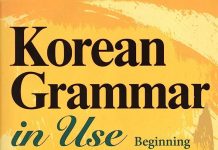 이것은 웨슬리의 책이에요.
이것은 웨슬리의 책이에요.
(= 이것은 웨슬리 책이에요.)
This is Wesley’s book.
이분은 부디 씨의 선생님입니다.
(= 이분은 부디 씨 선생님입니다.)
This is Bu-di’s teacher.
제 이름은 요코입니다.
(= 저의 이름은 요코입니다.)
My name is Yoko.
Grammar Focus:
의 expresses the possessive relationship of the first noun being the possessor of the second noun. It corresponds to the possessive ‘of or ‘(Noun)’s’, in English. When 의 is used in this possessive sense, it can be pronounced as either [의] or [에] although [에] is used most often.
Furthermore, the particle 의 is often omitted in colloquial speech. In the case of pronouns representing people, such as 나, 저, and 너 rather than being omitted, 의 combines with each to form 나의 -> 내,저의 -> 제 and 너의 ->네. In a sentence, 의 is placed between the possessor and the possession.
 Conversation:
Conversation:
A 이것은 누구의 우산입니까? Whose umbrella is this?
B 재준 씨의 우산입니다. It’s Jae-jun’s umbrella.
A 이분은 누구예요? Who is this person?
B 제이슨 씨의 어머니예요. (She’s) Jason’s mother.
A 이름이 뭐에요? What’s your name?
B 제 이름은 이민우예요. My name is Lee Min-u.
When referring to a group with which one is associated (home, family, company, country, or school), it is common to use the pronouns 우리/저희 in place of 나. Also, 우리 is used in place of 제 and 내 when referring to one’s family members. However, in the case of 동생, 내 동생 and 제 동생 are used more often than 우리 동생 (our younger brother/sister).
• 내 집 (my house) 一> 우리 집 (my/our house)
• 내 가족 (my family) 一> 우리 가족(my/our family)
• 제 회사 (my company) 一> 우리 회사(my/our company)
• 제 나라 (my country) 一> 우리나라 (my/our country)
• 제 학교 (my school) 一> 우리 학교 (my/our school)
• 내 어머니(my mother) 一> 우리 어머니 (my/our mother)
• 제 아버지 (my father) 一> 우리 아버지(my/our father)
• 제 언니 (my older sister) 一> 우리 언니 (my/our older sister)
• 제 남편/아내 (my husband/wife) 一> 우리 남편/아내 (my husband/wife)
• 제 딸/아들 (my daughter/son) 一> 우리 딸/아돌 (my/our daughter/son)
*제 동생 (my younger brother/sister)
When showing respect to the listener, 저희, the humble form of 우리 is used. Examples include 저희 어머니 and 저희 아버지. However, when referring to one’s country, only 우리 나라 is used, not 저희 나라.
Click below:
N이/가
N은/는
N을/를
N와/과, N(이)랑, N하고
N의
N에 ①
N에 ②
N에서
N에서 N까지, N부터 N까지
N에게/한테
N도
N만
N밖에
N(으)로
N(이)나①
N(이)나 ②
N쯤
N처럼, N같이
N보다
N마다


![[Korean grammar] ‘ㅅ’ 불규칙 (Irregular Conjugation)](https://sayhikorean.com/wp-content/uploads/2021/10/112.1.jpg)
![[Korean grammar] ‘ㅎ’ 불규칙 (Irregular Conjugation)](https://sayhikorean.com/wp-content/uploads/2021/10/111.1.jpg)
![[Korean grammar] ‘르’ 불규칙 (Irregular Conjugation)](https://sayhikorean.com/wp-content/uploads/2021/10/110.1.jpg)
![[Korean grammar] ‘ㄷ’ 불규칙 (Irregular Conjugation)](https://sayhikorean.com/wp-content/uploads/2021/10/109.1.jpg)
![[Korean grammar] ‘ㅂ’ 불규칙 (Irregular Conjugation)](https://sayhikorean.com/wp-content/uploads/2021/10/108.1.jpg)
![[Korean grammar] ‘ㄹ’ 불규칙 (Irregular Conjugation)](https://sayhikorean.com/wp-content/uploads/2021/10/107.1.jpg)
![[Korean grammar] ‘ㅡ’ 불규칙 (Irregular Conjugation)](https://sayhikorean.com/wp-content/uploads/2021/10/106.1.jpg)
![[Korean grammar] Indirect Quotation Contracted Forms: -대요, -래요, -재요, -냬요](https://sayhikorean.com/wp-content/uploads/2021/10/105.1.jpg)
![[Korean grammar] Indirect Quotations](https://sayhikorean.com/wp-content/uploads/2021/10/104.1.jpg)
![[Korean grammar] Direct Quotations: ‘Quoted speech’ + 하고/라고 + V](https://sayhikorean.com/wp-content/uploads/2021/10/103.1.jpg)
![[Korean grammar] A/V-(으)ㄴ/는데요 Additional Endings](https://sayhikorean.com/wp-content/uploads/2021/10/102.1.jpg)